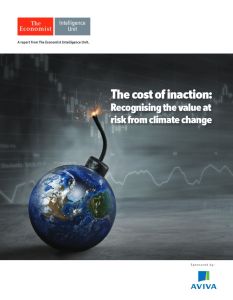Join getAbstract to access the summary!

Join getAbstract to access the summary!
The Economist Intelligence Unit
The Cost of Inaction
Recognising the Value at Risk from Climate Change
EIU, 2015
What's inside?
The vast majority of asset managers view climate change as an environmental problem rather than an investment issue. Here’s why they are wrong.
Recommendation
Discussions about climate change typically focus on environmental impacts – storms, droughts, floods, and the like. Yet investment managers and investors around the world will feel the effects of climate change on their portfolios, in the form of weaker asset growth and lower returns. These losses could be severe, particularly if business and government fail to address the issue soon. This sobering report from the Economist Intelligence Unit puts some numbers on the financial and economic costs society will have to bear in the years to 2100. getAbstract recommends this cogent analysis to fund managers, investors and anyone who expects to draw a pension in the next 30 years or so.
Summary
About the Author
The Economist Intelligence Unit is an independent research and analysis organization.





















































































































Comment on this summary